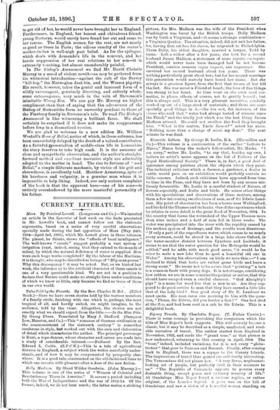Riverside Letters. By George D. Leslie, RA. (Macmillan and Co.)—This
volume is a continuation of the earlier "Letters to Marco," Marco being the writer's fellow-artist, Mr. Marks. " I am sorry," writes Mr. Leslie, "to say that, besides my own, I believe no artist's name appears on the list of Fellows of the Royal Horticultural Society." There is, in fact, a good deal of ignorance among painters about the objects which they paint. The technical criticism which a farmer, a gardener, a dealer in cattle would pass on an exhibition would probably contain no little censure. Indeed, such criticisms have appeared from time to time in the Press, and they have not been by any means uni- formly favourable. Mr. Leslie is a careful student of Nature, of flowers especially, and fruits and birds. He mixes other things with his speculations and observations of these matters, among them a few interesting recollections of men, as of Sir Edwin Land. seer. His point of observation has been &house near Wallingford, and his field the Thames and its banks. One of the experiences which he relates in some detail is the great flood of November, 1894. In the country that forms the watershed of the Upper Thames more than nine inches and a half of rain fell in three weeks. The water was precipitated into the river with the rapidity caused by the modern system of drainage, and the results were disastrous. "If only a part of the superfluous water, which comes to us nearly every autumn, could be stored in a large lake above Oxford, in the water-meadow district between Eynsham and Lechlade, it seems to use that the water question for the Metropolis would be settled," and he adds, with much good sense, "it would be fat wiser to make a new lake than to spoil a beautiful old one in Wales." Among his observations on birds we note this :—" I am inclined to think that larks are rather game birds and leave a strong scent." Ile seems not to be aware that "pointing" a lark is a common fault with young dogs. It is not strange, considering how seldom we see in some counties the pointer or setter, that this should have escaped even a careful observer. "God Almighty's pigs" is a name for wood-lice that is new to us. Are they sup- posed to do good service to man that they have earned a title like that of the lady-bird ? One good story of Sir E. Landseer we must quote. His man came one morning to him with the ques- tion, "Please. Sir Edwin, did you horder a lion ? " One had died at the Zoo, and had been sent in a cab to Sir Edwin. This is s delightf ul 'book.










































 Previous page
Previous page